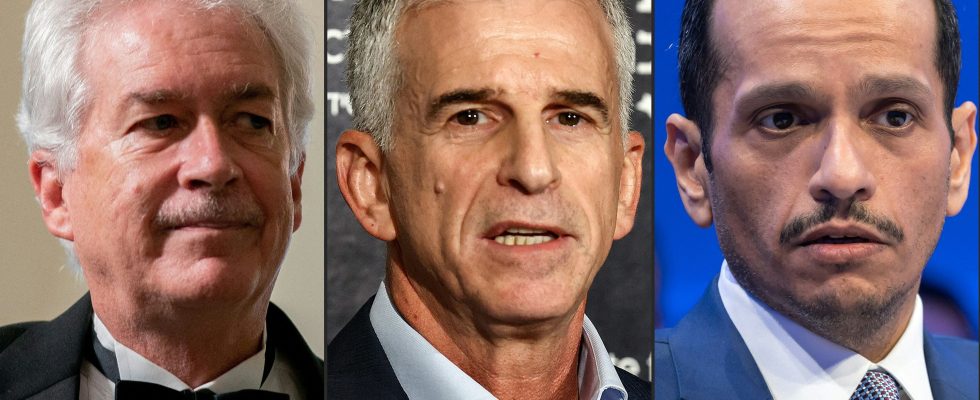Could the ongoing negotiations in Cairo lead to a second truce in the fighting in Gaza? Since Tuesday, discussions have been held under the aegis of Egypt for a ceasefire in the Palestinian enclave. Around the table, Egyptian officials, therefore, but also from the United States, Israel, Qatar, as well as a delegation from Hamas which is due to arrive this Wednesday, February 14 in Cairo.
From France to the European Union, from the UN to humanitarian NGOs, pressure from the international community is growing stronger for Israel and Hamas to find a ceasefire agreement, if possible lasting. . In particular with the prospect of avoiding at all costs a large-scale Israeli operation in Rafah, this town in the south of the Gaza Strip where nearly 1.4 million Palestinians who fled the war are refugees. Described as the “last bastion” of Hamas by Israeli Prime Minister Benjamin Netanyahu, he ordered the preparation of an offensive on Rafah to ensure a “complete victory” over the Palestinian Islamist group, provoking numerous warnings international, up to the United States.
This Wednesday, it was even the president of the Palestinian Authority Mahmoud Abbas, not very talkative and influential since the start of the conflict, who spoke in favor of a ceasefire. Based in the West Bank and rival of Hamas, the Fatah leader called on Hamas to “quickly” conclude a truce agreement with Israel in order to “avoid an attack by the occupation against Rafah which would lead to thousands of victims and an exodus of our people.” Without forgetting the pressure put on Israel by certain families of the 130 hostages still held by Hamas in Gaza, whose concern is growing more than four months after the start of the conflict.
Qatar and the United States at the center of the game
At the table of these negotiations, hoped to be decisive by many, we find several central figures since the start of the war between Israel and Hamas. First of all, the director of Mossad David Barnea, responsible for representing the Jewish state. Director of the Israeli secret services since 2021, within which he will have climbed all the ranks during his career, he has built a reputation as a discreet and efficient man. As much a spy as a diplomat, the 58-year-old man, sometimes even considered as Benjamin Netanyahu’s real Minister of Foreign Affairs, was one of the architects of the first truce in the fighting last November, which allowed the release of 110 hostages Israelis.
Facing him in Egypt, as in Qatar a few months ago, we find on the American side William Burns, the director of the CIA. At the head of the American secret services since 2021, he also enjoys a flattering reputation across the Atlantic. Appointed following the fiasco of the hasty withdrawal of the United States from Afghanistan in 2021, completing two decades of highly contested American foreign policy in the Middle East, this trained diplomat is used to international negotiations. American Ambassador to Jordan then to Russia, deputy to the head of American diplomacy from 2011 to 2014 under Barack Obama, he distinguished himself in particular by being one of the rare members of the administration of President George W. Bush to advise him not to intervene in Iraq in 2003.
Last key protagonist: the Prime Minister of Qatar, Mohammed bin Abdelrahmane Al-Thani. Also Minister of Foreign Affairs of the emirate, he too has played a very important role since the start of the war. Qatar notably hosted the negotiations for the first truce last November, and had established itself as a controversial but essential mediator behind the scenes of the conflict. Because if Qatar is the land of welcome for several political leaders of Hamas and has been one of its main financiers for several years, its Minister of Foreign Affairs has gradually become the privileged interlocutor of the rest of the world to represent the Palestinian Islamist group. And first of all from the United States: the head of American diplomacy Antony Blinken visited Qatar again on February 6, where he held a press conference with his counterpart Mohammed ben Abdelrahmane Al-Thani on the progress in discussions for a truce.
“Positive” discussions
Apart from these three strong personalities, we also find representatives of Hamas, a delegation of which is due to arrive in Cairo this Wednesday – without meeting Israeli representatives, therefore -. As well as obviously Egypt, also very active in the discussions since the start of the conflict, and which does not welcome these new negotiations by chance.
A “very senior Egyptian official” quoted by Egyptian television AlQahera News assured that the discussions had so far been “positive” and will continue for “the next three days”. What is there to hope for an agreement by the end of the week?
